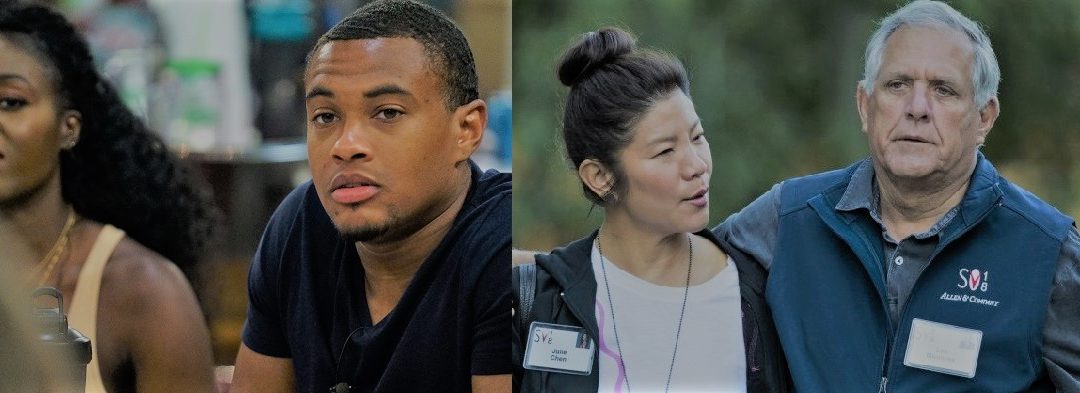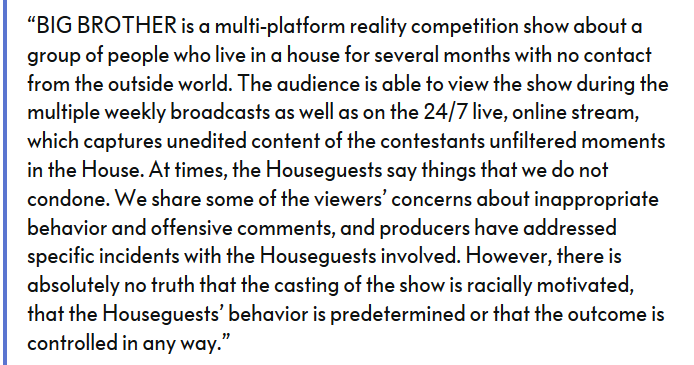From the premiere of Big Brother in June, ratings were down as more questions about casting and Julie Chen’s future at CBS were raised.
The 21st edition of Big Brother opened with a 1.2 rating among adults 18-49 and 4.89 million viewers on CBS.
That’s down 20 percent in the 18-49 demo (versus 1.5 last year) and down about 8 percent in viewers (from 5.33 million) in 2018.
That’s after a significant drop in the ratings last year, 18 percent overall, meaning the Big Brother ship is sinking.
Overall for the season, Big Brother is down 25 percent in adults 18-49 and down 20 percent in viewers across its three weekly airings.
That’s a wake up call to the network which renewed the show for next season, but with no promises to make any significant changes.
One of the major reasons for the sharp decline is the casting decisions that have made the reality TV show look more like 1999 than 2019.
Big Brother has faced charges of racism for years, but this season has made it obvious, forcing CBS executives to respond.
Minority contestants have struggled to gain traction in the show, often put in the Big Brother house with an overwhelming number of white players.
In fact, no African American male has ever won the show in its 21 seasons.
BB21 started this summer with alpha white guy Jackson Michie nominating the two African American houseguests, David Alexander and Kemi Fakunle.
Alexander was the first cast member to leave the game.
The following week, alpha white guy Jack Matthews nominated Fakunle again, and she was evicted.
[READ: BB21 Sinking in Blatant Racism]
Also gone, Ovi Kabir (his parents were born in Bangladesh) and Isabella Wang (whom Matthews had called “rice pudding” for her Asian background).
Fakunle addressed her castmates’ conduct on Twitter after leaving the game, calling it disgusting.
“I am extremely disappointed and disgusted by the behavior I am being made aware of that occurred thus far in the Big Brother house,” she wrote. “The degrading and threatening comments made by some houseguests and laughed at by others are outrageous and hard to see. I am saddened to be associated with such a negative display of human character and am horrified that this is now a part of my life story.”
Ovi was reluctant in an interview to call all of his former housemates racist, but admitted it probably played a role in the early evictions.
“Subconsciously, yeah, I think some things came into play,” said Kabir. “Kemi, David, and I are three people from different backgrounds that don’t share the same commonalities as some of these other houseguests in there. So bonding in certain ways is more difficult for us in those things. And you find whatever you can in the house to single somebody out. And so maybe our differences were the reasons why it played in some people’s heads.”
CBS finally released an official comment addressing the controversy surrounding the long-running reality show.
In a joint statement from the CBS and BB producers, the network said:
Anyone who has watched Big Brother for a length of time knows there are seasons where the racism is evident.
Following the infamous Season 15, with repeated displays of racism, sexism and homophobia inside the house, CBS entertainment president Nina Tassler said she was “mortified.”
GinaMarie Zimmerman used the N-word and made a variety of racially insensitive comments about fellow houseguests and later lost her job as a pageant consultant.
Aaryn Gries, Zimmerman’s best friend in the game and cohort when it came to some of the most offensive comments uttered in the house, was let go by the modeling agency that once represented her.
But she has shown little remorse, claiming her racist comments were “taken out of context.”
And Spencer Clawson, who offered misogynistic and homophobic comments, later apologized for his “boneheaded” comments and “bad jokes.”
Big Brother host Julie Chen Moonves agreed Season 15 was blatantly racist in an interview with The Hollywood Reporter.
“The thing that was hardest for me to watch was when we had overt racism in the house,” said Julie. “This girl named Aaryn, we thought she was going to be America’s sweetheart, the girl next door, this blonde from Texas. In the interviews, now looking back, I think she knew how to give those beauty queen answers. But after a few weeks, that beauty fades, when the inside comes out and the inside is ugly. I mean ugliest to the bone. And she starts saying homophobic things, racist things.”
Chen-Moonves has signed a deal to return to the network for the 22nd season.
Her roots at CBS are deep, first as an intern in 1990, and as the host of Big Brother since 2000.
She started using her full married name – Julie Chen Moonves – after her husband Les Moonves resigned as CEO of CBS last September.
[READ: Devastating Expose On Former CBS Boss Les Moonves]
The disgraced media mogul was accused of sexual misconduct by a dozen women.
Moonves denied all accusations.
After Ronan Farrow’s New Yorker exposé last year detailed six separate allegations of sexual harassment against her husband, Julie released this statement:
“I have known my husband, Leslie Moonves, since the mid-’90s, and I have been married to him for almost 14 years. Leslie is a good man and loving father, devoted husband and inspiring corporate leader. He has always been a kind, decent and moral human being. I fully support my husband and stand by him.”
Chen Moonves, 48, resigned as co-host of The Talk back in September.
While Big Brother is cheap for the network to make for a summer replacement show, the huge ratings drop the past couple seasons should signal big changes are ahead.



